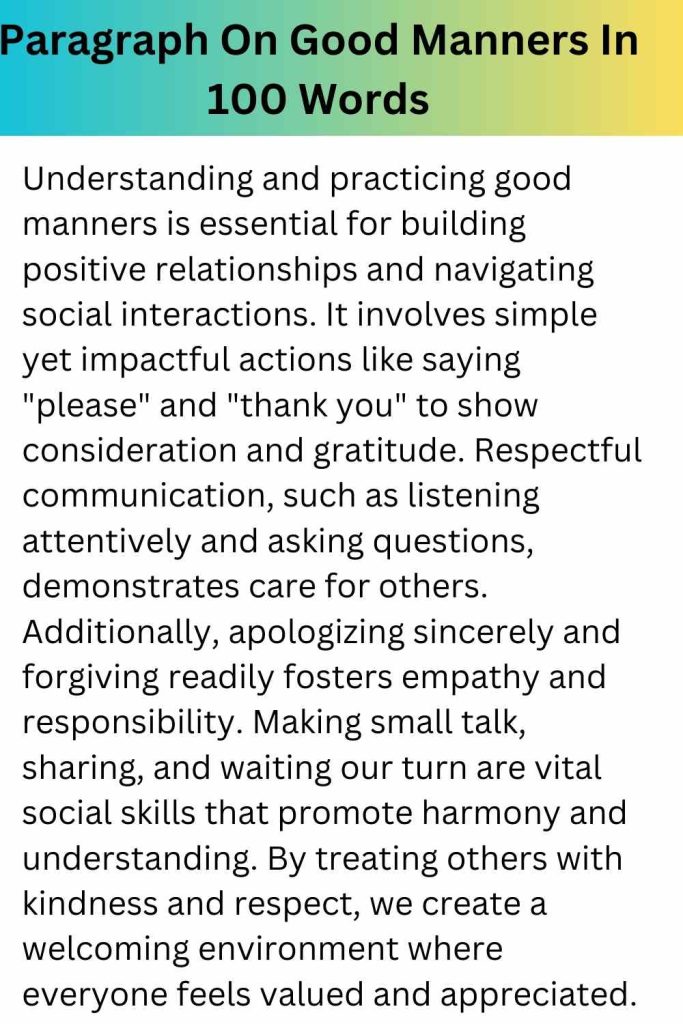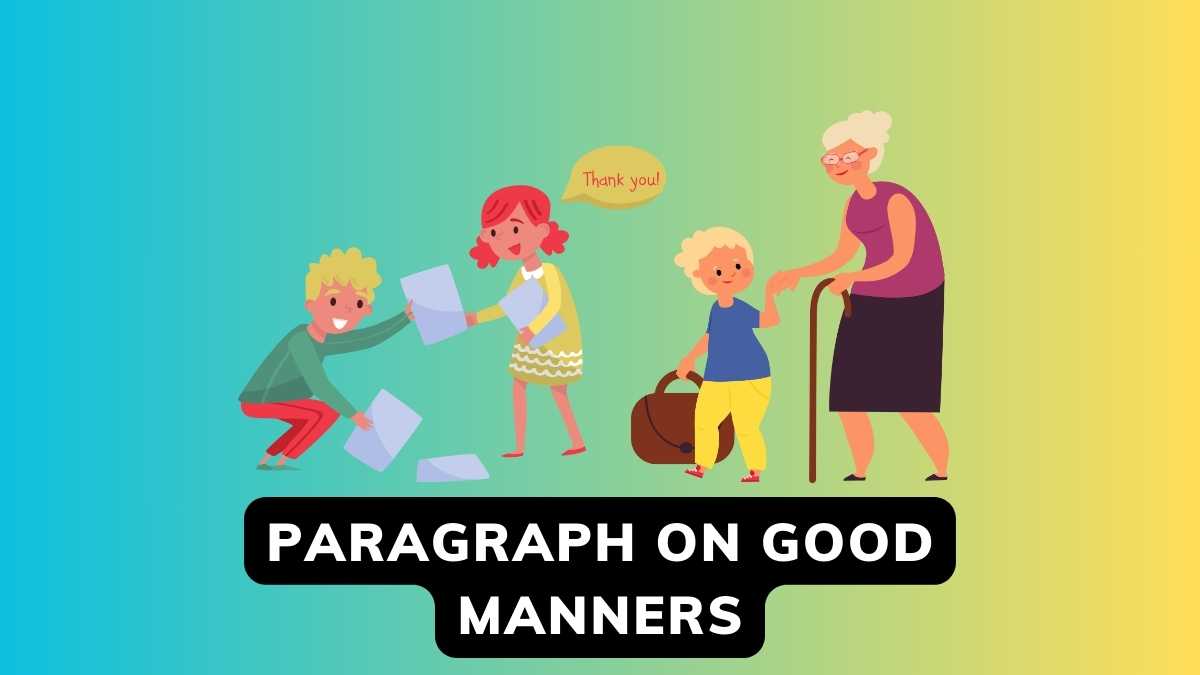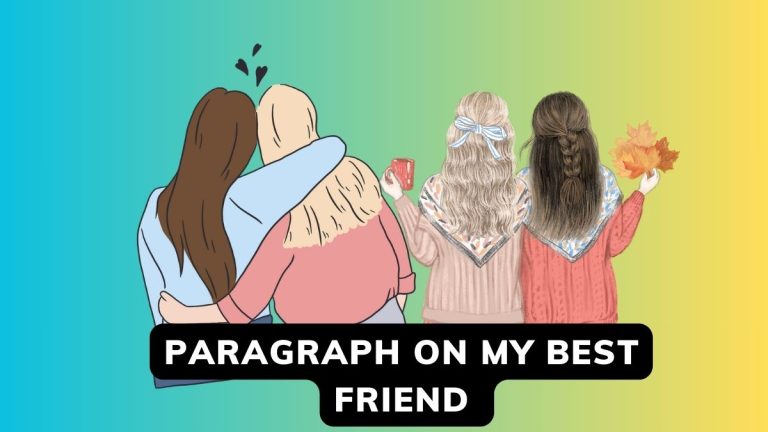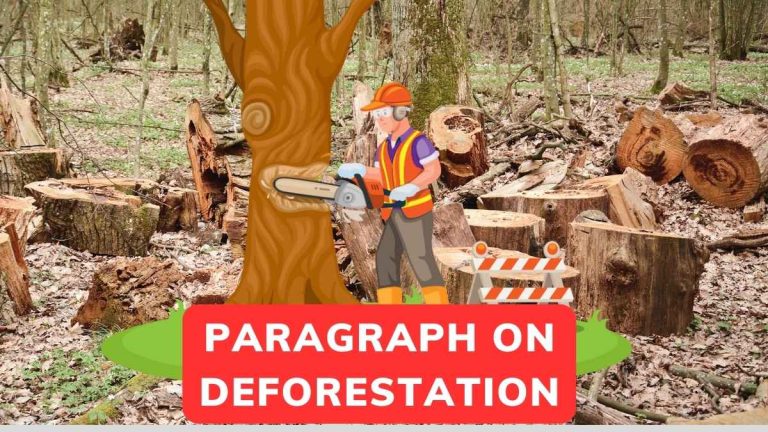Paragraph On Good Manners In English For Class 3-10
Paragraph On Good Manners For Class 3
Good manners are like a guidebook for how to treat others kindly and respectfully. They’re important because they help us make friends and create a happy atmosphere around us. Saying “please” when we ask for something and “thank you” when someone helps us are examples of good manners. It’s also polite to greet people with a smile and a friendly “hello.” We should listen when others are talking and wait for our turn to speak. If we accidentally do something wrong, it’s important to say “sorry” and try to make things right. Sharing our toys and being patient while waiting in line are also good manners. Remember, treating others the way we want to be treated is the golden rule of good manners. So let’s all try our best to be polite, kind, and considerate every day.
Paragraph On Good Manners For Class 4
Good manners are like a magic key that opens doors to positive relationships and harmony. For instance, saying “please” and “thank you” are simple yet powerful ways to show consideration and gratitude towards others. It’s also important to listen when others speak, showing them respect and care. Apologizing when we make mistakes and forgiving others when they apologize teaches empathy and responsibility. Additionally, smiling and having a positive attitude can brighten not only our day but also the lives of those around us. Making small talk and asking questions show interest in others and help build friendships. Furthermore, sharing with others and waiting our turn teach us important life skills and consideration for others’ needs. Ultimately, treating others the way we want to be treated forms the foundation of good manners, fostering kindness and mutual respect in our interactions.
Paragraph On Good Manners For Class 5
Learning about good manners is an important part of growing up. It’s like learning how to be kind and respectful to everyone around us. We say “please” when we ask for something, and “thank you” when someone helps us. It’s also important to listen when others are speaking and wait our turn to talk. We should always try to be friendly and have a positive attitude, because that makes everyone feel happier. Saying sorry when we make a mistake shows that we care about others’ feelings. And don’t forget to share with others and treat them the way we want to be treated. These little acts of kindness make a big difference in how we interact with others and how they feel about us. So let’s remember to always be polite and considerate, and we’ll make the world a better place for everyone!
Paragraph On Good Manners For Class 6
Good manners are like the secret ingredient that makes friendships stronger and interactions smoother. They are small gestures that show we care about others and respect their feelings. Saying “please” and “thank you” are simple yet powerful ways to show consideration. When we apologize sincerely and forgive others, it shows empathy and maturity. Even something as simple as smiling and having a positive attitude can brighten someone’s day. Making small talk helps us connect with others, while listening attentively and asking questions show that we value their thoughts and opinions. Saying “excuse me” when needed and waiting our turn demonstrate patience and respect. And most importantly, treating others the way we want to be treated forms the foundation of good manners. So, let’s remember to sprinkle kindness and consideration into our daily interactions, making the world a better place for everyone.
Paragraph On Good Manners For Class 7
Learning about good manners is an important part of growing up. It’s all about showing kindness, respect, and consideration towards others. Saying “please” and “thank you” are simple yet powerful ways to show politeness and gratitude. It’s also essential to listen when others are talking and ask questions to show interest in their ideas and feelings. While making small talk might seem trivial, it’s actually a valuable social skill that helps in building friendships and maintaining good relationships later in life. Sharing with others and waiting your turn are acts of consideration that demonstrate care for those around us. Remembering to apologize when we make mistakes and forgiving others when they apologize shows empathy and responsibility. Ultimately, treating others the way we want to be treated forms the foundation of good manners, making the world a nicer and more harmonious place for everyone.
Paragraph On Good Manners For Class 8
Understanding good manners is essential for everyone, including children. These simple yet significant behaviors help us interact respectfully and considerately with others. Saying “please” and “thank you” shows appreciation and consideration for others’ feelings and needs. While making eye contact is traditionally seen as respectful, it’s important to understand that not everyone is comfortable with it, and that’s okay. Apologizing when necessary and forgiving others demonstrates empathy and responsibility. Smiling and having a positive attitude can brighten someone’s day and create a pleasant atmosphere. Engaging in small talk, listening attentively, and asking questions show interest and respect for others’ thoughts and feelings. Saying “excuse me” and waiting your turn exemplify consideration and patience. Additionally, sharing and treating others as you would like to be treated promote kindness and empathy. By practicing good manners, we contribute to a more harmonious and respectful community.
Paragraph On Good Manners For Class 9
Understanding and practicing good manners is essential for every individual, regardless of age. These simple acts of courtesy not only show respect for others but also contribute to building positive relationships and a harmonious society. Saying “please” and “thank you” demonstrates consideration and gratitude, while looking people in the eye when speaking conveys respect. It’s important to understand that not everyone may feel comfortable with direct eye contact, and that’s okay. Apologizing when we make mistakes and forgiving others when they apologize fosters empathy and responsibility. Smiling and maintaining a positive attitude can brighten someone’s day and create a pleasant atmosphere. Engaging in small talk, listening attentively, asking questions, and sharing compliments are all ways to show genuine interest and care for others. Additionally, waiting our turn, sharing, and treating others with the same kindness and respect we desire for ourselves are fundamental principles of good manners. By practicing these behaviors, we contribute to a culture of kindness and consideration, making the world a better place for everyone.
Paragraph On Good Manners For Class 10
Good manners are essential for creating positive interactions and relationships with others. They serve as guidelines for showing respect, consideration, and empathy towards fellow human beings. By saying “please” and “thank you,” we acknowledge the needs and actions of others, demonstrating appreciation and gratitude. While making eye contact is often seen as a sign of respect, it’s important to understand that not everyone feels comfortable with it, so respecting personal boundaries is key. Apologizing when necessary and forgiving others when they apologize shows empathy and responsibility for our actions. Sharing, waiting our turn, and treating others as we would like to be treated are fundamental principles of good manners that contribute to harmony in society. By practicing these behaviors, we not only show kindness and consideration to others but also cultivate positive relationships and contribute to a happier and more respectful community.
Paragraph On Good Manners In 100 Words
Understanding and practicing good manners is essential for building positive relationships and navigating social interactions. It involves simple yet impactful actions like saying “please” and “thank you” to show consideration and gratitude. Respectful communication, such as listening attentively and asking questions, demonstrates care for others. Additionally, apologizing sincerely and forgiving readily fosters empathy and responsibility. Making small talk, sharing, and waiting our turn are vital social skills that promote harmony and understanding. By treating others with kindness and respect, we create a welcoming environment where everyone feels valued and appreciated.
Paragraph On Good Manners In 100 Words PDF

Paragraph On Good Manners In 150 Words
Good manners play a vital role in our daily interactions, shaping how we communicate and relate to others. By incorporating simple yet impactful practices into our behavior, we can cultivate a respectful and considerate demeanor. Saying “please” and “thank you” demonstrates politeness and appreciation for the efforts of others. While maintaining eye contact is a common sign of respect, it’s essential to recognize that not everyone may feel comfortable with this gesture, emphasizing the importance of respecting individual preferences. Apologizing and forgiving when necessary fosters empathy and accountability, contributing to healthy relationships. Additionally, engaging in small talk and actively listening to others show interest and care, facilitating meaningful connections. Sharing, waiting our turn, and treating others with kindness and fairness are fundamental principles that promote harmony and understanding in society. By practicing good manners, we not only enhance our interactions but also contribute to a more positive and inclusive environment for everyone.
Paragraph On Good Manners In 200 Words
Understanding and practicing good manners is essential for everyone, especially young students. Good manners are like the glue that holds our social interactions together, creating harmony and respect among individuals. One of the basic aspects of good manners is using polite language, such as saying “please” when making a request and “thank you” when receiving something. It shows consideration and appreciation for others. Additionally, showing empathy and forgiveness when mistakes are made fosters understanding and healthy relationships.
Respecting personal boundaries, including the way we communicate, is crucial. While making eye contact is often seen as a sign of respect, it’s important to recognize that not everyone may be comfortable with it. Being attentive and actively listening when others speak demonstrates respect and care for their thoughts and feelings.
Furthermore, small gestures like saying “excuse me” when interrupting or waiting patiently for one’s turn exhibit consideration for others. Sharing with others and offering compliments are also ways to spread positivity and build connections.
In essence, good manners are not just a set of rules but a way of showing kindness, empathy, and respect towards others. By practicing good manners, students can cultivate meaningful relationships and contribute to a positive and harmonious environment in both their academic and social lives.
Paragraph On Good Manners In 250 Words
Good manners are essential aspects of social interaction, teaching children valuable skills that contribute to respectful and harmonious relationships. From a young age, children are taught to use polite language, such as saying “please” and “thank you,” which demonstrates consideration for others’ needs and fosters gratitude. Respectful communication is emphasized, encouraging children to listen attentively when others speak and to ask questions to show interest in their thoughts and feelings.
Additionally, teaching children to apologize and forgive when necessary helps them develop empathy and take responsibility for their actions. While making small talk may seem trivial, it is an important social skill that lays the foundation for building friendships and succeeding in future endeavors, such as maintaining employment. Furthermore, encouraging children to share and wait their turn instills consideration for others and helps them appreciate the value of patience and generosity.
Moreover, emphasizing the importance of treating others the way they want to be treated encompasses all aspects of good manners, promoting kindness, respect, and empathy. By incorporating these principles into their daily interactions, children learn to navigate social situations with grace and integrity, fostering positive relationships and contributing to a more harmonious society. Good manners not only benefit individuals but also create a ripple effect of positivity that enriches the lives of those around them.







